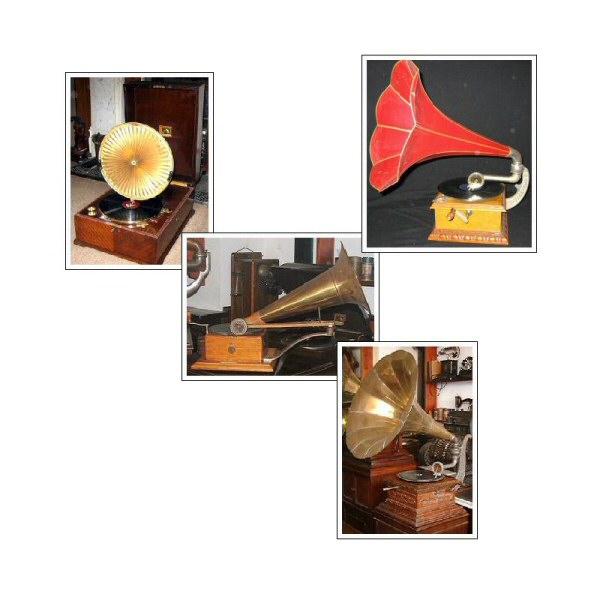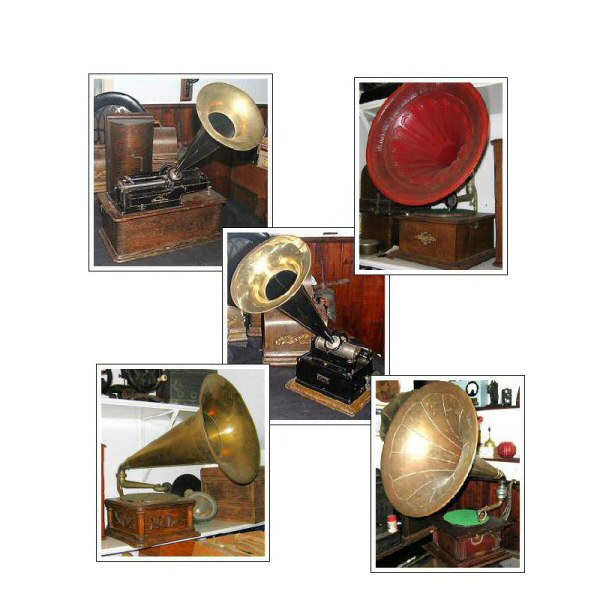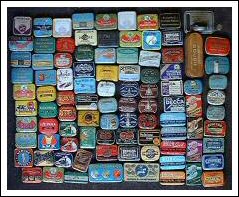
Digger: Hello Ian. How are you today?
Ian:
Fine thanks.
Digger:
That's good. Can you please tell us your background and how
you got into the 'phonographs and gramophones business?'
Ian:
It's a hobby that became a business. My first gramophone
came my way after I cycled into the back of a truck in a heavy
rainstorm in New Zealand. I woke up with my mouth all stitched
up and my teeth wired in. The truck had broken down, I had
my head down and he was parked on a big sweeping corner of a
main road and as I came round the sky went black and I must
have looked up at the last minute because I didn't bang my
head. I hit my jaw. So I woke up in hospital and the
neighbours came into the ward with a black HMV portable and
that swung it for me. Although we had a gramophone in the
house which was my father's pride and joy. A Chinoiserie
monster. I blew it up through a loud speak, actually,
plugging it into the wrong output when I was about seven.
Digger:
What year was that?
Ian:
About 1954. I was born in '44.
Digger:
You sound very young if you don't mind me saying so.
Ian:
Young's however you want to be in life. I keep active, not deliberately
but activity happens to me! (Laughs) Family keep me on the
ball, both young and old members.
Digger: Phonographs, gramophones - what other types of
collectables does The SoundBox deal in?
Ian: I don't deal a lot in phonographs these days and I'm picky
about what I deal in on the gramophones side. A lot of this
stuff has gone by the wayside. The younger generation aren't
so interested as you can also see in general markets. So
it's quite a specialised market really David. I deal mainly
in HMV and EMG gramophones, and other rare or early quality
makes, but do repairs to all makes. I replace motors,
springs, repair governors, and I restore soundboxes,
replacing diaphragms and rubber gaskets as necessary to
improve volume and to achieve a better reproduction without
annoying buzzing from loose pivots, perished rubber, or
buckled/cracked diaphragms, all common faults.
I also restore and sell vintage telephones, skeletons,
candlesticks, bakelite pyramids, farmhouse - all early
originals. I can also wire to work on BT and other pulse
dialing telephone lines.
Digger: How did the business come about Ian?
Ian:
I worked as an architect up until 1980 and then took
voluntary severance and I bought this shop for my wife just
before the redundancy came along and she was going to get
her teeth into it but it needed some restoration work. I was
going to do it in my spare time but with the redundancy I
ended-up starting an antiques shop which did well for a
decade or so and then the 1990s saw it off as a flourishing
business. So we pulled our horns in and diversified. I was
still doing gramophones and that was busy until my primary market
The Japanese caught a cold in the mid-nineties. Their
economy went down the pan. Run-of-the-mill gramophones don't
make money, they just cause you heartache because by the
time you've repaired them and put all the work and parts in
you hardly cover your costs.
Digger:
So that's why you are focusing on the quality items?
Ian:
Yes. And trying to make the business more streamlined. For
example, I also had some horns in the attic. Very big papier
mache and about ten feet long. I had to pack two of those
to send to Hong Kong. I sold a small one on eBay for £500,
I think, and then I was able to sell some more. But I had to
pack them which took a day and a half to pack and drive them
to the buyer which was a five-hour round trip! So I don't want
to do too much of that. You don't like to turn business down in this market.
It's not every day I do that but some things that seem
simple end up being a lot more work.
Digger:
Yes, I get the same thing and it's probably true in most
businesses. I have some clients who repair jukeboxes and
it's a skill that's almost dying out with the guys that are
running these businesses having started in the sixties or
seventies. I only know one where the stepson is coming
through to continue the business. Do you see yourself as
part of a dying trade as it were?
Ian:
Well, it's a geek collector's area and we got all sorts of extraordinary
people over the years. Not so much now.
Digger:
Are these gramophones and phonographs popular with props
companies and film and TV people?
Ian:
Yes, but they can easily get hold of an Indian replica and
they use them where it irritates the life out of me. Because
I see a quality film where the atmosphere of the movie is
spoilt because the repro stands out like a sore thumb. Small
things like that, they should be paying attention to.
Digger:
I tend to notice inaccurate dialogue in period films where a
word or phrase wouldn't have been used then. Did they make a
mistake with the sound equipment in The King's Speech?
Ian:
I haven't looked at that yet.
Digger:
You should do because the speech therapist uses a
gramophone.
Ian:
I've got the video so I'll take a look.
Digger:
I hope it doesn't spoil it for you.
Ian:
I collect records and I have The King's abdication speech.
It's no good trying to sell records because the youngsters want
something different these days. I like jazz and have had
mixed experiences with buying and selling them. There were
five single-side pressings of Jabbo Smith I was offered for
£1,500 on Brunswick and I played them on a lightweight
stylus and they sounded fantastic. I couldn't justify the
price and I thought the market would only take £200 or £300
or so for each of them and so I'd be standing still. The
seller put
them into an auction and they made £750 each!! (Digger
laughs) I'm a pragmatist though. I have seen items that I have sold
to people for, say, £5,000 and then it sold for £15,000
twelve years later. I could cry over that but it's a long
gap in which time they increase in popularity.
Digger:
And also that £5,000 would be worth a lot more in today's
money.
Ian:
There's more demand for things sometimes and so what do you
do? Some people would still think they're worth £5,000.
Digger:
It's the old adage of something only being worth what somebody
is prepared to pay for it.
Ian:
Exactly. And that guy who bought it then put it on another auction and
made another £3,500 overnight.
Digger:
Amazing. Where did you learn the skills to repair so
many different machines and mechanisms?
Ian:
I've always been interested in vintage cars and I restored
an Austin 7 from a wreck in time for my 15th birthday, and
in time to obtain my NZ driving licence... and although I'm not a qualified engineer I can use a lathe
and do stuff by hand.
Digger:
And you just get stuck in and it works?

Ian:
I know what I'm doing - that's the difference. I guess I was
born with a mechanical mind, just wind me up and I'll go for
hours! I've gained the years of experience ands know exactly
what to do if something isn't working. I know the weak
points on motors, for instance. I know about acoustic
functions and anything on the tube from the Soundbox to the
end of the horn. Getting in trouble there could cause problems
with the sound reproduction.
Digger:
You're real old school, because today's engineers have a laptop and
plug it into a circuit board and they replace a card or a
hole module.
Ian:
That's not really something that interests me.
Digger:
Who are your 'typical' customers and what sorts of comments
are you getting from them?
Ian:
Well, I can count a few household names who were pleased
with their purchases or repairs. Amongst them, John Paul
Getty Jnr., whose EMG was constantly on the go, and needed
regular servicing of the electric motor; Fred Zimmerman, for
whom a loyal band of Film and TV people clubbed together to
commission me to find and restore to new condition, an HMV
gramophone he had left behind in Germany when he departed
for the USA due to the political climate in the 1930s. I
then regularly called on him at his office just off Berkeley
Square with 78rpm records to replace the collection he also
had lost; Michael Flatley - he bought an HMV Monarch horn
gramophone. Many others from diverse backgrounds, some
became firm friends, some who sent lovely thank you notes,
and/or still call when in need of records or a service, over
31 years...
I was pulled in as an aside on a BBCTV programme on Graham
Dalby and the Grahamophones, around 1982(?) where initially
they wanted to film inside my shop surrounded by exotic
gramophones, and I seized the opportunity to offer my
vintage Rolls-Royce for the opening shot, pulling up
outside, getting out and opening up. My ploy was to get them
to film a long shot from over the road to include the name
of the shop. It worked, and then for continuity, I was asked
to do a voiceover while they filmed me sorting 78s. I was
asked what type of customers I attracted, amongst other
things. My reply was mainly the older generation revisiting
their fun youth, people who wanted an interesting gramophone
for it's own character, and youngsters who had heard some
snappy tunes on air somewhere, looking for 78s and the means
to play them. We were included in the grand finale at the
Waldorf which was period dress, live music from the
Grahamophones playing 1920s 1930s hot foxtrots like Harry
Roy, whilst endless bottles of champagne flowed! The Rolls
had pride of place outside, but I cant remember whether that
was included in the film...
I also appeared on BBCTV's Victorian Roadshow around 2000 as
a Phonograph and Gramophone "Expert",
demonstrating the difference between the Phonograph,
invented in 1878 by Edison, and the Gramophone, invented by
Emile Berliner in 1888.
I have sold or hired many articles during the life of my
shop to film and TV companies, mainly Thames Television,
Twickenham Studios, and Shepperton Studios.
Digger:
You have an excellent condition 1950s Bush TV identical to
the one in my office for sale (but mine doesn't work.) How
easy (or hard) would it be to get it working?
Ian:
I used to deal in early TV and Radio, but stopped due to
lowering levels of interest in this area, but there is a 405
line TV society which you could contact, and I think Gerry
Wells, who runs the Vintage Radio Museum in Dulwich is
connected to it, also does repairs to these and radios. (020
86703667)
Digger: Why is there such a large and broad interest in
retro and nostalgia in our society?
Ian:
I guess there is a fondness for the products of the first
industrialised country, a section of which were artistically
executed, appealing to the eye, with a measure of security
through familiarity with what our parents had in the way of
cars, telephones, radios and other household products.
Digger:
How difficult is it getting to source spares and parts for
The Soundbox?
Ian:
I have enough spares to cover another ten years, and whilst
I can still obtain springs and needles to order, other parts
quite often have to be hand made by me.
Digger:
What do you enjoy most about what you do?
Ian:
I think it is the achievement of a thorough restoration
and recovering a rare and wrecked machine. Tricky repair or
feedback from pleased customers who appreciate what I do.
Digger:
You have another business doing architectural ironmongery
and period fittings. Can you tell us about that?
Ian:
The Ironmongery business didn't really get off the ground,
although it was set up properly, with Merchant Bank,
Ministerial approval for handling Credit Cards etc. we
couldn't obtain a cheap enough wholesale price, and the last
straw was finding our suppliers knocking their gear out
cheaper online,
Digger:
What are your plans for the future of the SoundBox business?
Ian:
I'll be busy attempting to beat the recession, as long as I
have my health! It's cyclical just as life is. That's
what happened with antiques - after the war they were
worthless and then they started to recover in the sixties.
There's been a slow recovery until the point where certain
collectables peak and go through the roof.
Digger:
TV has helped, both the antiques shows and also period
dramas.
Ian:
If you watch Bargain Hunt you'll see how hard it is to make
a profit on anything.
Digger:
Yes, they seem quite happy with negligible margins. Their
time and expertise must be worth more than that.
Ian:
Yes. But if you go round markets all you see is rubbish. Stuff
that was collectable in the seventies like Susie Cooper and
Midwinter and jazzy patterns, Poole pottery and so on -
they're having a real hard time selling it. Myson is up and
down.
Digger:
The only one in favour still is Clarice Cliff.
Ian:
That's always been the case. Goss china really went through
the roof - small articles with 'Present from Hastings' or
something on them and they became incredibly valuable around
the mid-eighties and then they dropped out of sight and you
can't get anything for them now. Not my scene, you understand,
but I'm just observing.
Digger:
How are you going to deal with this low-end of the cycle?
Ian:
I'd say there's another ten years before gramophones and so
on will pick up to the highs again. If I sell an Edison Gem
phonograph today for £300 that will be the same price it
was in 1985-88. But I've got a few restoration projects and the
spare parts, 100 tin horns. I do repairs, I do restorations
of all sorts of mechanical items and that should keep me
busy...
Digger:
Ian, many thanks for letting us know about your vintage
gramophones and phonographs business. It was fascinating.
Ian:
Thank you David.

Needle
tins